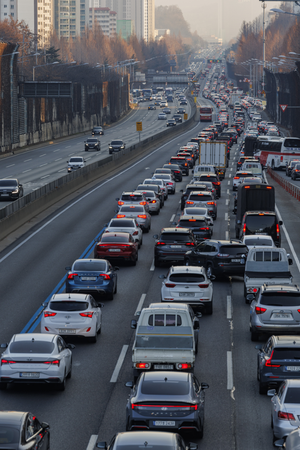Seoul, Jan 25 (IANS) Traffic on major highways continued to build up across South Korea on Saturday, marking the start of the Lunar New Year as people headed for their hometowns for one of the country’s major traditional holidays.
This year’s Lunar New Year holiday, known as Seol, has been extended to six days, lasting until Thursday, after the government designated Monday as a temporary national holiday.
As of 5 pm, a drive from Seoul to the southeastern port city of Busan, 320 kilometres away, was expected to take approximately five hours and 10 minutes, according to the state-run Korea Expressway Corp, Yonhap news agency reported.
A trip eastward to Gangneung, some 160 kilometres from Seoul, was expected to take three hours.
Traffic congestion on outbound routes from Seoul peaked between 11 am and 12 pm, and it was expected to ease around 7 pm to 8 pm, according to the agency.
In contrast, travel times heading toward Seoul were relatively shorter, with the drive from Busan expected to take four hours and 30 minutes, and the trip from Gangneung estimated at two hours and 40 minutes.
The agency estimated that 5.05 million vehicles would travel nationwide on Saturday, including 460,000 cars leaving the greater Seoul area and 360,000 cars heading toward it.
The agency noted that traffic on major highways was relatively smooth in both directions, adding that the traditional exodus was somewhat eased this year due to the extended holiday period.
The South Korean stock and foreign exchange markets will also be closed January 27 for a temporary holiday, their operators said Friday.
The foreign exchange market and financial markets, including the main Korea Composite Stock Price Index and the secondary tech-heavy KOSDAQ, as well as the ETF, derivatives and commodity markets, will be closed from the day through January 30 for an extended six-day holiday, according to market operators.
Seol, or Lunar New Year’s Day, is one of the country’s most celebrated traditional holidays. Many South Koreans travel to their hometowns during this time to perform ancestral rituals and spend time with their families.
–IANS
int/as


























